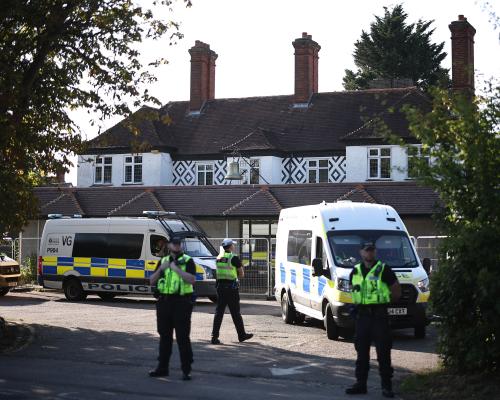
A high court judge has been asked to shut down a hotel housing asylum seekers amid concerns about violence and disorder seen at far-right protests at the site.
The local council applied for an urgent injunction against the owners of the Bell hotel in Epping, Essex, that would immediately prevent them housing asylum seekers – having repeatedly called on the Home Office to close it down.
A series of protests have occurred since an asylum seeker was charged with sexual assault against a 14-year-old girl in July. A second asylum seeker has since been charged with sexual assault.
During a hearing before Mr Justice Eyre on Friday, Epping district council’s lawyer Philip Coppel KC said the site had ceased to be used as a hotel – its “sole lawful use”. This, he argued, was a “clear breach” of planning law.
He also cited the concerns of local residents, as well as the safety of the asylum seekers themselves among the justifications for an immediate ban.
The hotel’s owners argued the planning issue was central – and was insufficient to justify the “exceptional step” of an immediate interim injunction. It could be dealt with via conventional enforcement action or at a final injunction hearing, they argued.
Piers Riley-Smith, representing Somani Hotels, argued asylum seekers had been housed at the Bell for about a year and a half without issue – with problems only arising recently.
He told the court: “In reality, this is an injunction by the council against the [recent] protests and the civil unrest. The council has targeted the wrong institution.”
Coppel claimed the placement of asylum seekers put the local community at “enhanced risk”. He said the alleged sexual offences took place close to the hotel – and that there were schools welcoming about 1,800 children in similar proximity.
“Having this sort of thing go on, with such a concentration of schools, with no measures to stop a repetition is not acceptable. That risk is needs to be removed … parents have the well-founded apprehension that the continued placement of asylum seekers at the Bell hotel represents a risk to those students.”
Coppel said the asylum seekers themselves were not safe. “The occupants, some of whom are vulnerable, are being housed in circumstances that can be described as intimidating. It is the last thing they need.”
Riley-Smith said his client believed local residents’ concerns were genuine. He said: “It is clear recent protests have expanded far beyond the local community and have gone into concerns about wider ideological or political issues.”
He argued that, if there were an urgent need to remove the asylum seekers and return the site to a conventional hotel because of fears about criminality, it would need to be shown the average asylum seeker has a greater propensity to commit crime than the average hotel guest. There was no such evidence, Riley-Smith told the court.
Moreover, he said, were protests to be used as a reason to grant an urgent injunction against housing asylum seekers, this could be repeated at any place being used to welcome them across the country.
Mr Justice Eyre reserved judgment until next Tuesday and ordered the hotel’s owners not to take in any new asylum seekers before then.



